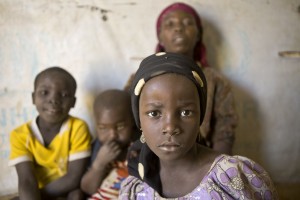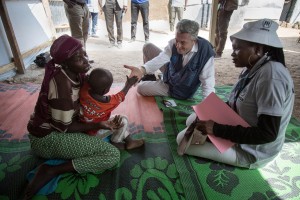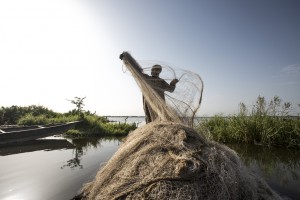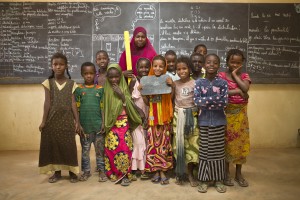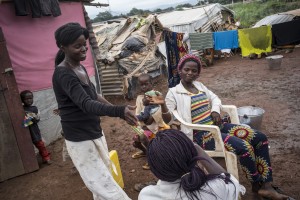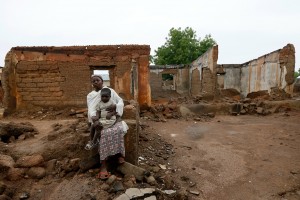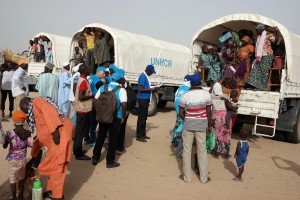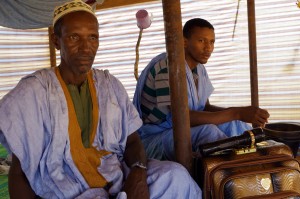Freed from Boko Haram, Nigerians still need help
Some children are malnourished and many families have nowhere safe to sleep amid lack of basic supplies and services in areas recaptured from insurgents
Tens of thousands of Nigerians liberated from Boko Haram face a desperate lack of food that has left some children severely malnourished and families struggling to make ends meet. Children are being sent onto the streets to beg for food or money, or on risky trips to surrounding fields to find firewood to sell. Many people still have nowhere safe to sleep, and some are camping in dilapidated schools. Mothers whose husbands were kidnapped or who have disappeared have been left to care for their children alone – sometimes up to 10 children – in places where they struggle to work or earn money, and many live with the fear that insurgents could attack them again.
Nigerian military operations earlier in 2016 in the country’s north-east pushed Boko Haram out of a sweep of some major towns, such as Monguno, 140 kilometres north of the Borno State capital, Maiduguri, and freeing tens of thousands of people from the insurgents’ rule. But UNHCR teams reported that conditions remain very difficult following a recent vulnerability screening mission they led with a partner NGO .
“Boko Haram attacked my village six weeks ago, they stole all of our belongings and our food,” said one mother called Falmata now living among the displaced in Monguno. Her husband disappeared and she fled with their baby on her back and their five-year-old daughter by her side to a makeshift site in Monguno called Kuya. Mamagona, her 16- month-old baby, is so malnourished she needed medical treatment at a nearby clinic. “Most people from my village fled and are in this camp with me,” said Falmata, 32. “Mamagona’s health started to deteriorate when we were in the camp. There is not enough food here and I don’t have enough millet to give to her, but I don’t want to go back to my village, it is too dangerous with Boko Haram in the area.”
Another mother, Jabba, 28, also said she could not find enough food for her family. “I am sending my children, including my youngest boy who is eight years old, to be in the streets to beg for money to buy food” she said. UNHCR teams noticed a lot of breastfeeding women in Kuya camp, including teenagers, as well as many young girls with children. The launch of livelihood projects is urgently needed to help women become self-sufficient and lessen the risk of people turning to survival sex.
More than 60,000 displaced people are living in nine temporary encampments in Monguno, and more new people arrive every week as military operations continue to dislodge Boko Haram further north. The Nigerian authorities and some aid agencies have arranged limited food distributions, but it is now key that these increase and are made more regular.
UNHCR is working with the regional government to find a new site where displaced people accommodated up to now in school buildings can properly be cared for, and meanwhile plans to provide basic household items like kitchen utensils, mattresses, mosquito nets, jerry cans, female hygiene materials, soap, and detergent.
Women whose husbands had been killed or kidnapped by Boko Haram remain traumatised, and they and their children need counselling and help to restart their lives, including to find ways to earn a living. Security continues to restrict aid agencies’ movements in parts of Borno, but UNHCR hopes to continue its vulnerability screening visits to sites in Banki, Dikwa and Gamboru-N’Gala in the next few weeks. These visits allow the refugee agency to assess needs and address gaps to better assist the internally displaced populations, especially in terms of security, shelter, psycho-social support, and livelihood activities, as well as to avoid duplicating tasks with other agencies.
More than two million people have been forcibly displaced in Nigeria, including 1.87 million who fled Boko Haram violence since 2014. Some 195,350 people have sought shelter in neighbouring Cameroon, Chad and Niger.
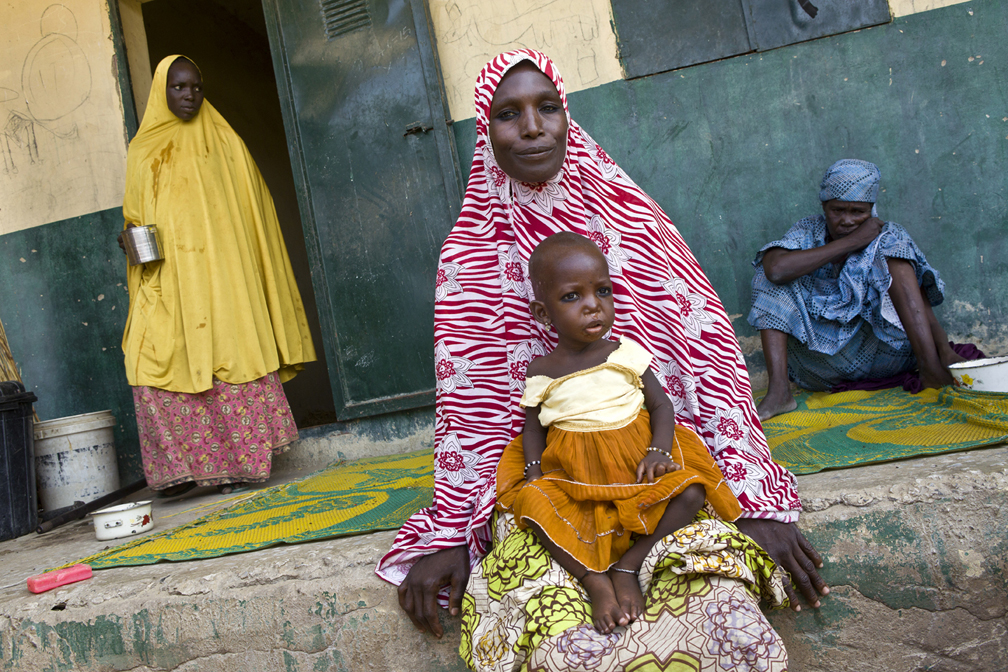
Falmata, 32, rests with her daughter Mamagona in Kuya camp, in Mongouno, north-east Nigeria. The sixteen-month-old girl suffers from malnutrition and is being treated at a small nearby clinic run by the non-governmental organization Halima. “Boko Haram attacked my village, in Marte local government, six weeks ago, they stole all of our belongings and our food” explains Falmata. “I walked for two days before reaching Mongouno, with Mamagona on my back, while my other daughter, who is five, was by my side. Most people from my village fled and are in Mongouno now, many are in Kuya camp with me. Mamagona’s health started to deteriorate when we were in the camp, there is not enough food here, I don’t have enough millet to give to her. The clinic at Halima gives her a Plum Peanut treatment but she does not like it, it makes her vomit. I don’t want to go back to my village at this point, it is too dangerous with Boko Haram in the area. I am alone with the girls, my husband left some weeks ago, he was fearing for his life because of the insurgents. I don’t know where he is, I have no news ” © UNHCR / Helene Caux
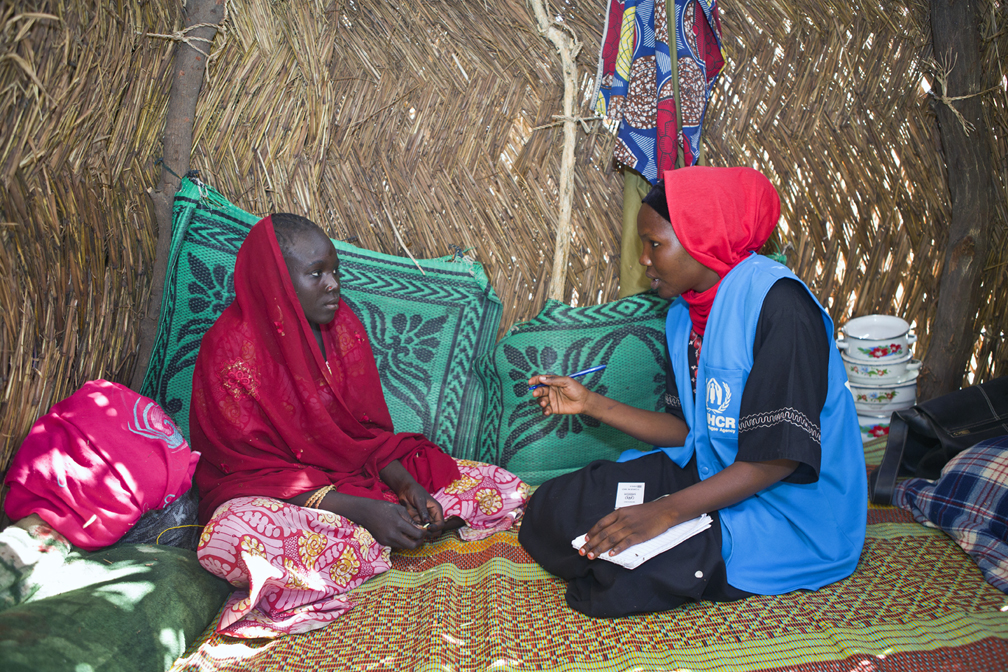
A UNHCR monitor interviews a displaced woman in Kuya camp, Monguno, about her needs and protection concerns. UNHCR teams found out that many families were headed by women because their husbands had been killed by Boko Haram, forced to join the insurgents or just disappeared in conflict. Many women and children remain traumatized by their time under Boko Haram rule. They and their children need counselling and livelihoods support. Food shortages, lack of decent shelters and rampant malnutrition among children are also major concerns. UNHCR / Helene Caux

